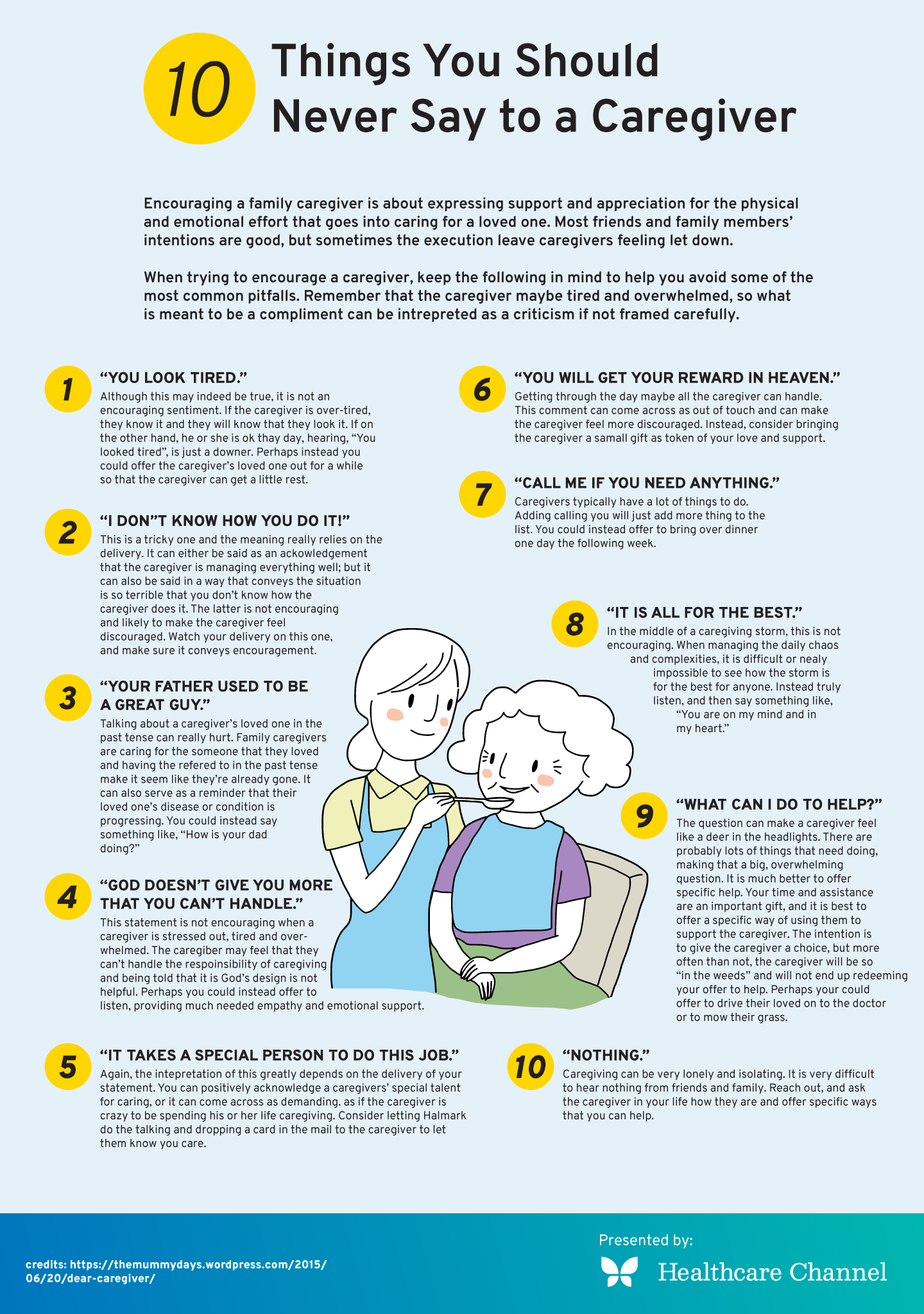10 Things You Should NEVER Say to a Caregiver
Share
Encouraging a family caregiver is about expressing support and appreciation for the physical and emotional effort that goes into caring for a loved one. What are the things you should never say to a caregiver? Most friends and family members’ intentions are good, but sometimes the execution leave caregivers feeling let down.
When trying to encourage a caregiver, keep the following in mind to help you avoid some of the most common pitfalls. Remember, that the caregiver maybe tired and overwhelmed, so what is meant to be a compliment can be interpreted as criticism if not framed carefully.
10 Things You Should NEVER Say to a Caregiver
1. YOU LOOK TIRED
Although this may indeed be true, it is not an encouraging sentiment. If the caregiver is over-tired, they know it and they will know that they look it. If on the other hand, he or she is okay that day, hearing “You look tired”, is just a downer.
Perhaps instead you could offer the caregiver’s loved one out for a while so that the caregiver can get a little rest.
2. I DON’T KNOW HOW YOU DO IT!
This is a tricky one and the meaning really relies on the delivery. It can either be said as an acknowledgement that the caregiver is managing everything well, but it can also be said in a way that conveys the situation is so terrible that you don’t know how the caregiver does it.
The latter is not encouraging and likely to make the caregiver feel discouraged. Watch your delivery on this one, and make sure it conveys encouragement.
3. YOUR FATHER USED TO BE A GREAT GUY
Talking about a caregiver’s loved one in the past tense can really hurt. Family caregivers are caring for someone that they loved and having the referred to in the past tense makes it seem like they’re already gone. It can also serve as a reminder that their loved one’s disease or condition is progressing. You could instead say something like, “How is your dad doing?”
4. GOD DOESN’T GIVE YOU MORE THAT YOU CAN’T HANDLE
This statement is not encouraging when a caregiver is stressed out, tired and overwhelmed. The caregiver may feel that they can’t handle the responsibility of caregiving and being told that it is God’s design is not helpful. Perhaps you could instead offer to listen, providing much-needed empathy and emotional support.
5. IT TAKES A SPECIAL PERSON TO DO THIS JOB
Again, the interpretation of this greatly depends on the delivery of your statement. You can positively acknowledge a caregivers’ special talent for caring, or it can come across as demanding. As if the caregiver is crazy to be spending his or her life caregiving.
Consider letting Hallmark do the talking and dropping a card in the mail to the caregiver to let them know that you care.
6. YOU WILL GET YOUR REWARD IN HEAVEN
Getting through the day maybe all the caregivers can handle. This comment can come across as out of touch and can make the caregiver feel more discouraged. Instead, consider bringing the caregiver a small gift as a token of your love and support.
7. CALL ME IF YOU NEED ANYTHING
Caregivers typically have a lot of things to do. Adding calling you will just add more things to the list. You could instead offer to bring over dinner one day the following week.
8. IT IS ALL FOR THE BEST
In the middle of a caregiving storm, this is not encouraging. When managing the daily chaos and complexities, it is difficult or nearly impossible to see how the storm is best for anyone. Instead, truly listen, and say something like, “you are on my mind and in my heart”
9. WHAT CAN I DO TO HELP?
The question can make a caregiver feel like a deer in the headlights. There are probably lots of things that need doing, making that a big, overwhelming question. It is much better to offer specific help. Your time and assistance are an important gift, and it is best to offer a specific way of using them to support the caregiver.
The intention is to give the caregiver a choice, but more often than not, the caregiver will be so “in the weeds” and will not end up redeeming your offer to help. Perhaps you could offer to drive their loved on to the doctor or mow their grass.
10. NOTHING
Caregiving can be very lonely and isolating. It is very difficult to hear anything from friends and family. Reach out, and ask the caregiver in your life how they are and offer specific ways that you can help.
These are just some of the things you should NEVER say to a caregiver. Feel free to print-out this infographic for your clinics, hospitals, or aged care facilities. Even in your homes!













